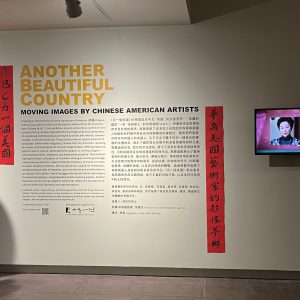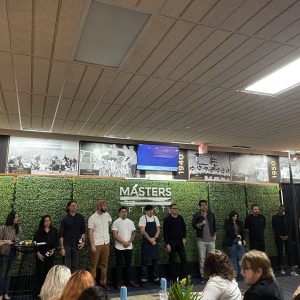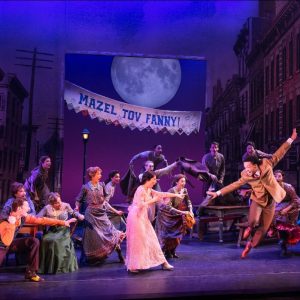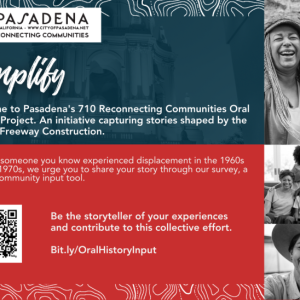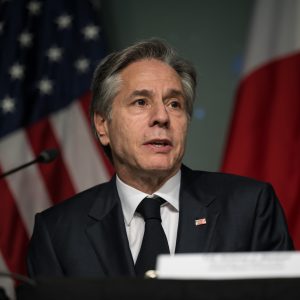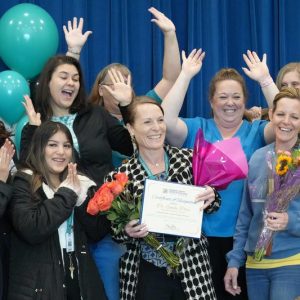 View Winners →
View Winners → Pasadena Master Chorale Fosters Young Musical Talent

The 2013 Beethoven 9th Concert with LA Daiku. – Courtesy photo
By May S. Ruiz
Jeffrey Bernstein, Artistic and Executive Director of the Pasadena Master Chorale (PMC), has always been into music and music-making. He started playing the piano when he was eight years old; when he was 13, he sang Beethoven’s Ninth Symphony in a choir.
Therefore, it is not surprising that Bernstein’s interest in music grew through the years. He relates, “Like many people, I came to choral music in school. For me it was in college, at Harvard. That’s a natural place to have terrific experiences of community. In a way I realized I wanted to give that experience to people who weren’t going to leave in four years. I wanted to see what it was like to deepen that sense of community and to be embedded in the broader Pasadena community.”
In 2009 Bernstein founded the Pasadena Master Chorale which he imbued with his own personal stamp to distinguish it from other choral groups. He explains, “For one, we’re auditioned and it’s a pretty rigorous process. We take, on average, less than half the people who audition for us. We also re-audition the group every year so singers have to demonstrate they’re continuing in keeping up. I believe the higher the quality of music-making, the greater the sense of community.”
Bernstein continues, “The other thing that sets us apart, and which I’m very proud of, is our pricing model. Our concerts are offered on a ‘listen first then give’ basis; we sell tickets for zero dollars. We want people to attend our concert then offer a gift to us as they are moved and able. We started this concept two years ago and our attendance and revenue have since gone up.”
“There are obviously people who can’t give very much, and I’m very proud of the fact that our concerts are so accessible to everyone. And there are people who give very generously because they recognize the value of what we do,” Bernstein opines.
Knowing that children are exposed to singing in a choir at a young age, whether it’s through a church or at school, Bernstein established an education program to foster middle and high school students’ love of music.
Bernstein explains, “Since we started we have always been involved with young people singing with us. It’s at the heart of what we’re trying to do, to create opportunities for young people who love choir music to learn about it and perform it. The program has grown tremendously and we currently have three offerings.”
According to Bernstein, their program for student singers is open to all Pasadena middle schoolers with a teacher’s recommendation. They rehearse with PMC’s associate conductor, Lauren Buckley Schaer, and perform a couple of pieces at the beginning of two of their concerts: Handel’s ‘Messiah’ and the Brahms concert.
With a teacher’s recommendation, high school students who want to get a deeper experience with choral music can join PMC as apprentice singers. Says Bernstein, “They rehearse with us every Monday night as full members and they sing all the pieces the PMC does, including the ‘Requiem’ which we sing in German. This is a much smaller group of students because it is a big demand on their time and requires more familiarity with choral singing.”
Bernstein adds, “This year, we are again holding a program we began last year called ‘Listening to the Future’. Through an application process, we select composers from local private and public schools. We team them up with a composer mentor who meets with them almost weekly starting in November through June. They write music for us and we perform their work. PMC’s final program of the year is entirely composed by high school students. June last year was the first time we put on this program and it was a huge success!”
“We had four composers last year; this year we have six and they’re already writing. During the spring they’ll come to our rehearsal every now and then to hear us sing their composition. It’s thrilling! It’s hard to tell who’s more excited, the students or the singers. It’s great to work with living composers, but to work with someone so young …. This is a rare opportunity for young composers to have a group play their composition, sing it and take it seriously. It’s almost unheard of. That’s a program I’m very, very proud of,” Bernstein proclaims.
“I’m a big champion of young people and music-making,” Bernstein expands. “I want our organization to serve the youth at as many different levels of development as possible. For this young composers program, we’re looking for students who are willing to roll up their sleeves and do the work. They must have had music training – maybe sang in a choir or played in an orchestra or band – and have a teacher’s recommendation. But we’re not going to judge their potential as creative people; instead we’re here to foster their talent and let them run with it.
Last year we came up with four completely diverse sets of music. It was beautiful! We don’t change what composers create, we don’t want to get in the way. We want to encourage creativity and we sing what they write for us.”
‘Listening to the Future’ commences right after Labor Day, when PMC publicizes the program and accepts applications. At the end of October, PMC selects the composers who start working with mentors in November. Both mentor and student develop a schedule for what pieces need to be written and when. Each composer will write at least one arrangement of a folk song which should be finished by February and one original composition which they will write from February to April.
Bernstein says of this program, “Composing is a form of communication. Student composers are communicating with the singers and singers are communicating with the audience. We emphasize that the score has to be neat and without errors. Composers have to take into consideration if the words are easy to read, if the harmony is understandable.
It’s a very interesting process for these young students to experience. They spend months alone in a room in front of their computer or with a piece of staff paper writing their composition. Their faces light up when they hear a roomful of 60 people transform that music off the page. It’s utterly amazing when that happens!”
PMC holds five concerts a year. Its 2016-2017 season began on Dec. 11 when the group sang Handel’s ‘Messiah’ at First Congregational Church in Pasadena. On Jan. 15, PMC performed Beethoven’s Ninth Symphony at the Oratani Theatre in Downtown L.A. Brahms Unbound follows on April 22 and 23 at the Altadena Community Church. On June 10 and 11, PMC will be back at the Altadena Community Church to sing two pieces: Heinrich Schutz’s ‘Musikalische Exequien’ and Gabriel Faure’s ‘Requiem’. The season ends on June 25 at the Neighborhood Unitarian Church in Pasadena with a ‘Listening to the Future’ concert.
Financial support for PMC comes from the L.A. County Arts Commission, Pasadena Community Foundation, Pasadena Showcase House for the Arts, the City of Pasadena, and through various fund raising efforts.
While PMC has come far since Bernstein founded it, there are more things he wants to accomplish. Berstein wants one day to be able to purchase a building to house their education program, for students to come in five days a week after school, with a staff of people who can provide training from individual voice lessons to music theory and who will encourage students to have their own choral group with leadership.
“It’s limitless what you can do and realize what difference you can make in one kid’s life … not just with choral music, but for them to have a place to belong,” Bernstein states wistfully.














